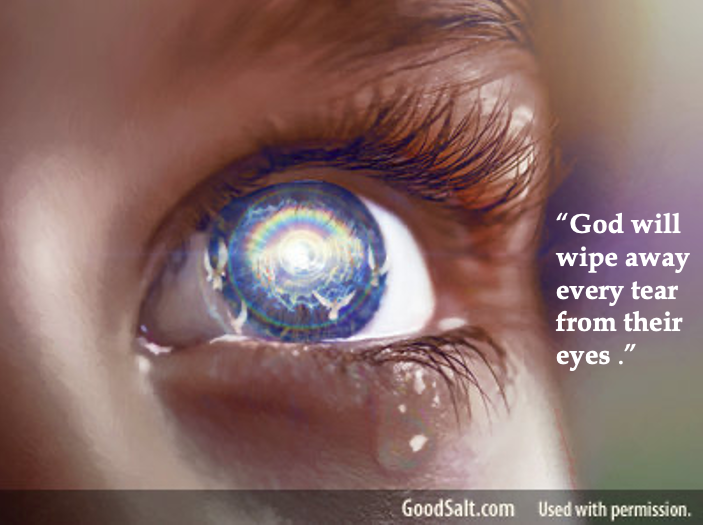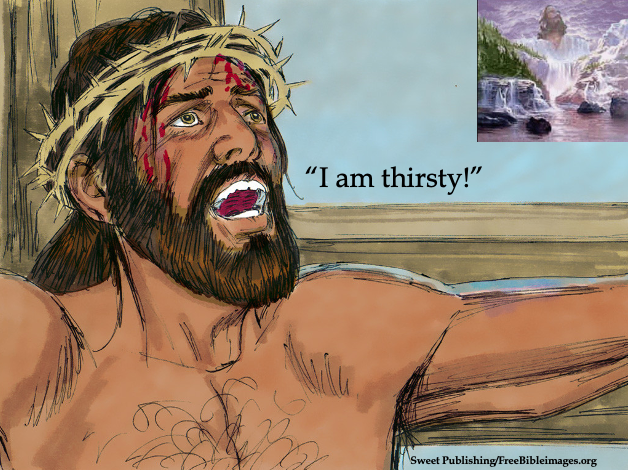“And God will wipe away every tear from their eyes; there shall be no more death, nor sorrow, nor crying. There shall be no more pain, for the former things have passed away.” Revelation 21:4
After the apostle John watched the New Jerusalem descend out of heaven from God to the new earth in this new vision about heaven (21:2), he hears the last of twenty times the phrase, “a loud voice,” is used in the book of Revelation, signifying a very important announcement. 1 “And I heard a loud voice from heaven saying, ‘Behold, the tabernacle of God is with men, and He will dwell with them, and they shall be His people. God Himself will be with them and be their God.’” (Revelation 21:3). This loud voice most likely belonging to an angel, proclaims, “Behold, the tabernacle of God is with men, and He will dwell with them, and they shall be His people” (21:3a). The word “tabernacle” (skēnē) refers to a “transcendent celestial tent.” 2 The verb form of this word is also in this verse, and it is translated “will dwell” (skēnōsei) and means to “set up His tent” 3 or “take up residence” 4 with them.
In this final stage of heaven, believers “will enjoy a new intimacy with God which is impossible in a world where sin and death are still present.” 5 God will finally “tabernacle” or dwell among His cleansed and forgiven people, and they will experience perfect fellowship with Him on the new earth.
“This fellowship existed, to some extent, when God walked with Adam and Eve in the Garden of Eden, and when He dwelt among the Israelites in the tabernacle and later in the temple, hence the reference to ‘the tabernacle’ (cf. 13:6; 15:5). It also existed partially when Jesus Christ ‘tabernacled’ among people (John 1:14). It exists today as God inhabits the bodies of Christians individually (I Corinthians 6:19-20) and the church corporately (Ephesians 2:21-22).” 6
God’s “tent” or presence will be among humankind: “God Himself will be with them and be their God” (21:3b). At His first coming, Jesus Christ “dwelt” (eskēnōsen) among humankind, but He was rejected by them (John 1:10-11). In the New Jerusalem on the new earth, Christ will dwell with humanity in perfect harmony forever. 7 Unlike the temporary tabernacle in the Old Testament, the presence of God among humankind on the new earth will be permanent (Revelation 22:5). 8
Heaven is where God lives. So, in the final stage of heaven, there will no longer be a separation between heaven and earth because God will dwell on the new earth with His redeemed people forever (Revelation 21:1-3). Thus, heaven and the new earth will essentially be the same place. 9
God’s glorious presence on the new earth will introduce many wonderful changes. “And God will wipe away every tear from their eyes; there shall be no more death, nor sorrow, nor crying. There shall be no more pain, for the former things have passed away.” (Revelation 21:4). This one verse reveals several things you will not find in this final stage of heaven:
- “wipe away ever tear from their eyes.” There will be no more broken hearts … rejection… loneliness… grief. No more heartache. That is heaven. God will wipe away every tear from your eyes. You will not have sadness or grief again. There will be no disappointing memories. Those will either be erased, or we will look at them from God’s perspective and no long experience sadness. Those of you who are grieving the loss of a loved one or maybe you have been going through a period of depression, one of the things that does in our lives is it just makes heaven seem a little bit closer. We want to go to heaven when we are in pain. Why? Because there is none there.
- “there shall be no more death.” There will be no funerals or cemeteries in heaven. Why? Because in this final stage of heaven on the new earth no one ever dies. You won’t ever have to be concerned about losing a loved one because death will be gone forever!
- “there shall be no more pain.” In heaven, there will be no more bad hair days ladies and gentlemen. Everything about us will be perfect. This will be a glorious time. We will have glorified bodies. There will be no eyeglasses, no braces, no wheelchairs, no hearing aids, and no crutches. There will be no more hospitals, no ambulances, no CPR. COVID-19 will not exist, aspirin will be gone, accidents over, heart attacks banished, AIDS a distant memory, cancer done away with. No more chronic pain forever!
All the pain and suffering we face now will be forever gone! Why? “For the former things have passed away” (21:4b). Anything associated with the fallen world will “have passed away,” never to return. The sin that caused tears, pain, and death will be forever removed! We can enjoy uninterrupted fellowship with God and with His people. All of creation eagerly awaits this new earth (Romans 8:20-23).
“How different is this concept of heaven from that of Hinduism, for example? Here heaven is depicted as a city, with life, activity, interest, and people, as opposed to the Hindu ideal of heaven as a sea into which human life returns like a raindrop to the ocean.” 10
It is important to observe that the complete removal of pain and sadness takes place long after the Judgment Seat of Christ which occurs in heaven during the seven-year Tribulation period (Revelation 4:1-4; cf. 2 Thessalonians 2:2-3). 11 It is at the Judgment Seat of Christ that some Christians will suffer the loss of rewards (I Corinthians 3:15; 2 Corinthians 5:10), which will include shame (I John 2:28) and a deep sense of regret (Matthew 8:12; 24:48-51; 25:24-30; Luke 19:20-26). 12 At the most, this painful loss of reward will not last beyond the Millennial Kingdom since the permanent removal of pain and sadness takes place when the New Jerusalem rests upon the new earth (Revelation 21:1-4). It is conceivable that this painful sense of loss will take place only at the Judgment Seat of Christ and not beyond that. However, one cannot be dogmatic about the length of time this sense of loss will last.
This new, joyful experience on the new earth is made possible because of Jesus Christ. “Then He who sat on the throne said, ‘Behold, I make all things new.’ And He said, ‘Write, for these words are true and faithful.’” (Revelation 21:5). Jesus is portrayed as the One “who sat on the throne.” He is presented as the Judge in the book of Revelation. He is the Judge Who walks among the seven lampstands (Revelation 1); He judges the seven churches (Revelation 2-3); He judges rebellious humankind (Revelation 4-19), and He judges nonbelievers (Revelation 20). 13
Now the apostle John hears the Lord Jesus Christ, proclaim, “Behold, I make all things new.” Following His many judgments, King Jesus, announces that He is making “all things new.” This is a summary of the entire vision that the apostle John receives. It is the climax of the entire book of Revelation.
“Think about it. No more terminal diseases, hospitals, wheelchairs, or funerals. No more courts or prison. No more divorces, breakdowns, or breakups. No more heart attacks, strokes, or debilitating illnesses. No more therapists, medications, or surgeries. No famines, plagues, or devastating disasters. He is making all things new!” 14
The Lord Jesus says to John, “Write, for these words are true and faithful” (21:5b). Christ instructs John to “write” about all these new things: new heavens [universe], new earth, and a new capital city, the New Jerusalem. Since Jesus’ promise to “make all things new” may seem too good to be true or believed, He says to John, “for these words are true and faithful.” Christ’s promise can be believed and trusted because it comes from Someone who is “true” and never misleads or tells a lie (Titus 1:2). It is spoken by Him Who is always “faithful” to keep His promises (2 Timothy 2:13).
Heaven is going to be an incredible place! God loves you so much that He wants you to live with Him there for eternity. To do so, you must receive His free gift of eternal life. Why? Because the Bible says we are born with sinful hearts – “Surely, I was sinful at birth, sinful from the time my mother conceived me.” (Psalm 51:5). From the moment of conception, we possess a sinful nature that causes us to break God’s rules. Because all of us have sinned (Romans 3:23), we deserve to be separated from God forever in the lake of fire (Romans 6:23a; Revelation 20:15).
But God’s love for those who don’t possess eternal life is so great that in the final two chapters of the Bible He offers eternal life (“the water of life”) as a free gift (Revelation 21:6; 22:17). “The water of life” is eternal life and Jesus offers it “freely” to those who believe in Him. You don’t work for eternal life because it has already been paid for when Jesus died on the Cross for our sins and rose from the dead. Jesus said, “He who believes in Me has everlasting life.” (John 6:47).
What is Jesus asking you to do that is hard for you to trust Him with? Is He asking you to trust Him for eternal life, but it’s hard for you to let go of your works and trust Him alone? It is so simple that children get it and adults miss it. None of us are promised tomorrow. If you were to drop dead in the next minute, are you absolutely certain you are going to heaven? If you are not, you can make sure right now. Why would anybody put it off? You need to settle this issue right now and you need to put your trust in Jesus for eternal life.
When you trust Him, He gives you everlasting life (John 6:47), He forgives all your sins (Acts 10:43; Colossians 2:13-14), He places you in God’s family forever (John 1:12; 6:37), and He comes to live inside you through His Holy Spirit (John 7:39a; Galatians 4:6). He guarantees that you will live with Him forever in His heaven when you die or are removed from the earth through the Rapture of the Church, whichever occurs first (John 3:16; I Thessalonians 1:10; 4:13-5:11; I John 5:13).
If you just believed or trusted in Jesus alone for His gift of everlasting life, you can tell Jesus this through prayer. But praying this prayer is not what gets you to heaven. Only believing or trusting in Christ alone gets you to heaven. This prayer is a way of telling God you are now trusting in His Son.
Prayer: Dear Jesus, I come to you now as a sinner who cannot save him or herself. I believe You died in my place on the cross for all my sins and rose from the dead. I am now trusting in You alone, Jesus (not my good life, my prayers, or my religion) to give me everlasting life and a future home in Your heaven. Thank You Jesus, for the everlasting life I now have and the future home I will have in heaven. In Jesus’ name. Amen.
When you believed in Jesus, He gave you everlasting life which can never be lost (John 10:28-29). He forgave all your sins (Acts 10:43; Col. 2:13-14) and placed you in His family forever (John 1:12; 6:37). Christ’s Spirit now lives inside you to comfort, guide, and teach you how to follow Jesus as you read and apply the Bible (John 14:26; 15:26; 16:13-14; 2 Timothy 3:16-17). To help you grow in your new relationship with Jesus, please download our free digital Pressing on materials to go through with those you love.
If you found this article to be helpful, please share it with those you want to see in heaven. Thank you and may Jesus reveal more of Himself to you as you learn to follow Him.
ENDNOTES:
1. Tom Constable, Notes on Revelation, 2017 Edition, pg. 236; John F. Walvoord, The Bible Knowledge Commentary Epistles and Prophecy, Editors John F. Walvoord and Roy B. Zuck (David C. Cook, 2018 Kindle Edition), location 6537.
2. Walter Bauer, A Greek-English Lexicon of the New Testament and Other Early Christian Literature: Third Edition (BDAG) revised and edited by Frederick William Danker (Chicago: University of Chicago Press, 2000 Kindle Edition), pg. 928.
3. Bob Vacendak; Robert Wilkin; J. Bond; Gary Derickson; Brad Doskocil; Zane Hodges; Dwight Hunt; Shawn Leach; The Grace New Testament Commentary: Revised Edition (Grace Evangelical Society, Kindle Edition, 2019), pg. 1583.
4. Bauer, pg. 929.
5. Walvoord, location 6357.
6. Constable, pg. 236.
7. Vacendak, pg. 1583.
8. Charles Swindoll, Insights on Revelation (Swindoll’s Living Insights New Testament Commentary Book 15, Tyndale House Publishers, Inc., 2014 Kindle Edition), pg. 373.
9. Randy Alcorn, Heaven: A Comprehensive Guide to Everything the Bible Says About Our Eternal Home (Tyndale House Publishers, 2004 Kindle Edition), pp. 80-81.
10. Constable, pg. 237 cites Alan Johnson, “Revelation,” in Hebrews-Revelation, Vol. 12 of The Expositor’s Bible Commentary, Edited by Frank E. Gaebelein (Grand Rapids: Zondervan Publishing House, 1981), pg. 593.
11. Robert Wilkin; J. Bond; Gary Derickson; Brad Doskocil; Zane Hodges; Dwight Hunt; Shawn Leach; The Grace New Testament Commentary: Revised Edition (Grace Evangelical Society, Kindle Edition, 2019), pg. 1147.
12. Constable, pg. 237.
13. Vacendak, pg. 1583.
14. Swindoll, pg. 375.



